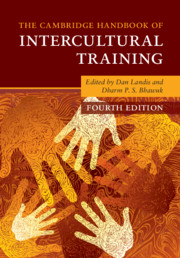Book contents
- The Cambridge Handbook of Intercultural Training
- Reviews
- The Cambridge Handbook of Intercultural Training
- Copyright page
- Dedication
- Frontispiece
- Contents
- Figures
- Tables
- Editors and Contributors
- Foreword
- Preface
- 1 Introduction and Theoretical Framework
- Part I Theoretical Foundations of Intercultural Training
- Part II Practice of Intercultural Training
- Part III Indigenous Psychology and Intercultural Training
- 15 Brazilian Cultural Patterns and Intercultural Training
- 16 Russian Cultural Patterns and Intercultural Training
- 17 Indian Psychology and Intercultural Training
- 18 Culture-Inclusive Theories for Intercultural Training in Confucian Societies
- 19 Japanese Psychology and Intercultural Training
- Part IV New Interdisciplinary Approaches to Intercultural Training
- Part V Summing Up
- Index
- References
15 - Brazilian Cultural Patterns and Intercultural Training
from Part III - Indigenous Psychology and Intercultural Training
Published online by Cambridge University Press: 18 September 2020
- The Cambridge Handbook of Intercultural Training
- Reviews
- The Cambridge Handbook of Intercultural Training
- Copyright page
- Dedication
- Frontispiece
- Contents
- Figures
- Tables
- Editors and Contributors
- Foreword
- Preface
- 1 Introduction and Theoretical Framework
- Part I Theoretical Foundations of Intercultural Training
- Part II Practice of Intercultural Training
- Part III Indigenous Psychology and Intercultural Training
- 15 Brazilian Cultural Patterns and Intercultural Training
- 16 Russian Cultural Patterns and Intercultural Training
- 17 Indian Psychology and Intercultural Training
- 18 Culture-Inclusive Theories for Intercultural Training in Confucian Societies
- 19 Japanese Psychology and Intercultural Training
- Part IV New Interdisciplinary Approaches to Intercultural Training
- Part V Summing Up
- Index
- References
Summary
Identifying cultural patterns of a country that come into play in an intercultural encounter is a key element of any intercultural training. In this chapter, we discuss the issues associated with intercultural training for expatriates who will serve in Brazil. Initially, we provide a view of historical, economic, and socio-political aspects that build up the Brazilian culture. Guided by indigenous studies, Brazilian cultural patterns are also discussed with an emphasis on an informal influence process that seems to be very relevant in that society: the Brazilian jeitinho. Differences in cultural patterns within the regions of Brazil are also suggested. We then dive into aspects that literature suggests as characteristics of the Brazilian culture, such as they relate to: hierarchy and power concentration; the value of personal relationships; paternalism and strong loyalty to one's in-group leader; formalism; posture of spectator; and flexibility. We conclude by discussing some attitudes and behaviors that Brazilian may adopt in cross-cultural encounters as they relate to communication, perception of time, personal relationships, and management and business styles.
Keywords
- Type
- Chapter
- Information
- The Cambridge Handbook of Intercultural Training , pp. 497 - 522Publisher: Cambridge University PressPrint publication year: 2020

